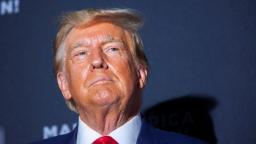
The Fulton County special purpose grand jury investigating former President Donald Trump’s efforts to overturn his 2020 election loss in Georgia recommended charges against 39 people, the unredacted grand jury report made public Friday shows.
Fulton County District Attorney Fani Willis, who had the ultimate charging authority, indicted 19 people, including Trump, alleging a conspiracy to subvert the election results. They have all pleaded not guilty.
Reports from special purpose grand juries are rarely made public, but the decision by a judge to do so here reflects the national interest and seriousness of the investigation. No wrongdoing has been accused against those not charged.
Here’s what to know:
List of investigation targets: The list of those recommended for charges is widespread: It includes a sitting US senator, South Carolina Republican Lindsey Graham; two former US senators from Georgia, David Perdue and Kelly Loeffler; former Trump national security adviser Michael Flynn; Trump adviser Boris Epshteyn; and pro-Trump attorney Cleta Mitchell.
The lengthy list of recommended charges underscores how widespread the special grand jury’s investigation was into efforts to overturn the 2020 election. Essentially acting as a fact-finding group, jurors heard from 75 witnesses overall and examined all levels of the effort to overturn the election results: Trump’s role, his lawyers, the fake electors in Georgia, and lawmakers.
A narrowed-down indictment: Willis’ indictment of 19 people on racketeering charges laid out a sprawling case against Trump and his co-defendants. But the special grand jury report makes clear that Willis had the option to ensnare even more people in her conspiracy charges had she chosen to do so.
The special grand jury report was only a recommendation, and the district attorney decided which charges to bring to a grand jury last month before the indictment was returned.
Trump-allied senators: The charges recommended against Graham, Loeffler and Perdue as part of the broader racketeering conspiracy and “national effort to overturn the 2020 presidential election,” though it did not return a unanimous vote against any of the lawmakers. No charges were brought.
After the 2020 election, Graham repeatedly prodded Georgia Secretary of State Brad Raffensperger and his colleagues on the phone about signature-matching of ballots in the Atlanta area. Raffensperger told CNN in November 2020 that he believed Graham “implied” that he should try to “throw out’ some ballots in the heavily Democratic area.
Graham defended making phone calls to Georgia election officials on Friday, saying he “had questions” and that it would be “irresponsible” as chairman of the Judiciary Committee not to ask them.
Loeffler and Perdue, who were both in the midst of Senate run-off elections in November and December 2020, both attended a meeting with Georgia Gov. Brian Kemp about convening a special session of the state legislature to help Trump’s quest to overturn the election.
